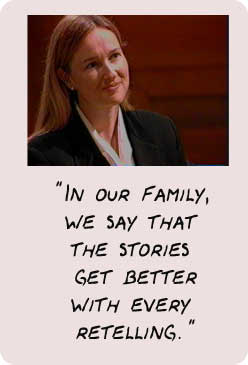|
|
Katalina Groh, Larry Prusak: Some of the world's leading thinkers |
 |
Katalina
Groh: opening session
Well, looking at the path I came to creating a series of videos, just this past six months. Iíve been making films for about ten years. But only in the last six months have I created a series which is called, ďReal People, Real StoriesĒ, focusing just on great teachers, leaders, whoever are terrific storytellers. Getting into storytelling was a natural progression. I donít think it was actually by design, it just came out as a series of discoveries. Iíve been making films for about ten years. I started out making independent feature films, and before that I traded bonds and currencies at the Chicago Board of Trade. So I didnít study film-making. I didnít study how to tell a good story. |
| But storytelling
was definitely part of my background from the time I was speaking. My parents
are not from the United States. I was the only one of our family born in
this country. And home for my family is the dinner table. I mean, now we
donít live in the same house where we grew up. So when we all come together,
wherever itís at, itís a table and we sit and talk and tell and retell
and retell the same stories. I mean laugh. We have a terrific time. But
we take turns retelling the same stories until two or three in the morning.
And we know them all. And we retell them. You know, friends of mine will
always ask me where did I get this, since I retell stories a lot.
And in our family, we say that the stories get better every time. (laughter) But they are retold. And thatís the basis of how I spent most of my childhood, just living, and learning, and learning about our history, and our past, where I was from, and so on. But when I went to school, I studied finance and economics, and I decided to be a trader at the Board of Trade. But I did that so that I could travel, two or three months out of the year. I had a lot of freedom. So I could paint and take photographs and that was a different form of storytelling, actually, because every painting I make is a story. So it was still kind of living my life, but going to work, and doing my work, but my life was still really about creating stories. And as sort of an accident, I was asked through some friends of mine to work on an independent feature film, which came to Chicago,. I accepted, and I was thinking out of curiosity that this would be interesting, and Iíd learn something new, and Iím a very curious person, and so I accepted. But the first day I was there, I knew that something had happened. I was just intrigued with the collaborative process of making a film, which is initially, how I got into making films. But over the next six months, the process of a hundred and fifty people working together to create a story. But the only bad part of that, which I was explaining a little earlier, is that the film that we were making was a low-budget action independent feature film, actually with gangs, I mean, real gangs in the streets of Chicago. So the only thing that we were really teaching was children how to kill each other. (Laughter) We sold the movie. In fact, we sold it even before we finished making it. Which is an unfortunate and sad kind of statement. But after that first film, I began making documentaries. I was very lucky, about six years ago, to be hired by the CEO of New World Entertainment, who was looking to create a new division, an educational division, which was called World Knowledge. And he was willing to try anything. He was just willing to try anything different, and in fact, when they hired me, when they offered me the job, I told them, ďI donít make educational filmsĒ. And he said, ďNo, but you tell stories. You tell very good stories.Ē And so he actually went completely outside of the market to find somebody who just liked to tell stories, and thatís how we launched that series. And one of the things that Iíll be speaking about tomorrow, which is an ongoing process for my company that we have a lot of fun, learning. It is a kind of an accident. It was one of the first things we discovered in creating educational films that are reality based in that people seem to remember what we were hoping they might learn or experience when the information was told within a story, when it wasnít just told, but when it was told by a great storyteller. People remember the story, which is how they remember anything that is new. This was very exciting. And the most exciting part of it is that, the more we work on this journey, specifically now on storytelling, the more we realize that itís really about creating experiences, which is what we are trying to do. And we have a lot of fun doing that. |
| Books and videos on storytelling *** In Good Company : How Social Capital Makes Organizations Work by Don Cohen, Laurence Prusak (February 2001) Harvard Business School Press *** The Social Life of Information, by John Seely Brown, Paul Duguid (February 2000) Harvard Business School Press *** The Springboard : How Storytelling Ignites Action in Knowledge-Era Organizations by Stephen Denning (October 2000) Butterworth-Heinemann *** The Art of Possibility, a video with Ben and Ros Zander : Groh Publications (February 2001) |
| The views expressed on this website are those of the authors, and not necessarily those of any person or organization |
| Site optimized in 800x600: webmaster CR WEB CONSULTING |
|
|
|
|